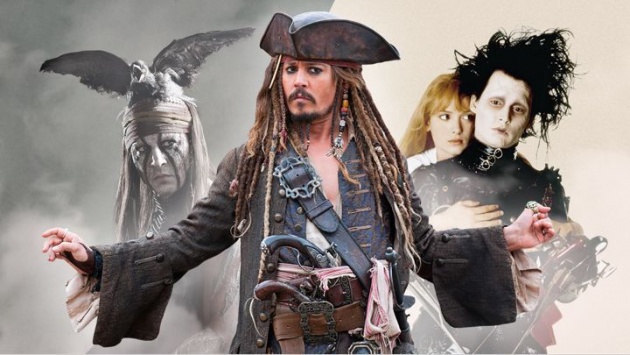who counterintuitively evolved into a superstar by resisting his matinee-idol looks in favor of whacked-out character-actor roles that sparked his imagination. And thenPirates of the Caribbean happened, and the rest is Bruckheimer-produced history Depp's descent into self-parody has certainly been lucrative — these days, the man can buy islands the way the rest of us buy coffee — but his reputation isn't what it used to be, (a few Mortdecais will do that to you). But you dismiss one of the world's last true movie stars at your own peril.
This weekend's Black Mass, in which the actor aims a loaded shotgun at our lowered expectations, could be the spark that ignites the Deppessaince. (Hey, if McConaughey gets one, our man Johnny should too). Smothering his good looks under a thin head of hair and his expressive eyes beneath a pair of cloudy contact lenses, Depp plays notorious Boston mobster Whitey Bulger with the kind of violent urgency you can't take for granted. The jury is still out on the overall effect: Some think that the gangster role is a return to form; others argue that it's just a more violent and Oscar-friendly version of the same grandstanding that's defined the back half of Depp's working life. Still, the fact that everyone's buzzing about it is a testament to the incredible scope of his legacy, slightly tainted or otherwise. Join us as we look back at the good, bad, and very ugly of a truly unusual career.
It was early in his career that Depp realized that his looks would be more interesting as an obstacle than a crutch — and Tim Burton was the perfect director to push him in the right direction. Essentially playing a sharper, Hot Topic version of Frankenstein's Monster, Depp transformed a character defined by his isolation into the kind of performance that would be embraced by everyone from Tiger Beat aficionados to arthouse snobs.
A dark mark on the cookie-cutter world of suburbia, Burton's lonely and disfigured hero is born into the world as a tragic figure. But Depp never allows Edward to know that; the actor's unblinking eyes reflecting the joy of every new experience. Clumsy except for when he's masterfully shearing the local shrubs (and poodles, and women), Edward is so gentle and uninterested in the violence suggested by his body that the vein-like scars streaking across his face soon begin to look like tears, and every time he cuts himself, you feel it too.
Depp actually isn't that bad in this Nineties quirkfest, but his performance as Sam, a Spokane eccentric with an affinity for silent film stars, so accurately predicts his future badness that it has to be mentioned here. On the one hand, the character allows the star to display a nascent gift for physical comedy; he recreates Charlie Chaplin's dancing dinner rolls routine with such casual perfection that he makes it look easy. On the other hand, Sam is the kind of character who's clumsily assembled from a mess of eccentricities in the baseless hope that they'll cohere into a real person. He's introduced hiding in a tree for fun. That tells you everything you need to know. Perhaps no one sentence has ever articulated Depp's future better than a passing line of dialogue that's aimed at him here: "Having a Boo Radley moment, are we?"
Depp doesn't exactly have a rich history of the playing the straight man (The Tourist is probably the closest he's come lately, and, well, the less said the better). Even by 1993, the normalcy of the star's eponymous role in in this drama was strikingly against type: His first major scene finds him sticking price tags onto soup cans in the podunk grocery store where he works.
Ripped from the pages of Abercrombie's most sensitive catalogue, Gilbert is the glue holding his tortured midwestern family together, his plainspoken narration allowing him to literally serve as the voice of reason. It's his relatives who are the strange ones, from the obese mother who never leaves their house to the mentally handicapped younger brother (Leonardo DiCaprio) whom he has vowed to protect. Depp is wonderfully endearing, and the disconnect between the actor's beauty and our hero's circumstance is at the heart of the film's fable-esque power.
Allow me to be frank at the commencement: You will not like me. The gentlemen will be envious and the ladies will be repelled. You will not like me now, and you will like me a good deal less as we go on. Ladies, an announcement: I am up for it, all the time."
So declares John Wilmot, Second Earl of Rochester, who may not be the most interesting character that Depp has ever played, but is almost certainly the horniest. It's a nice change of pace...though you wish that the actor weren't quite so dedicated to the historical hedonist's flair for the debauched. His tendency to inflexibly fixate on a certain way of playing a part should work for a character who can't resist his own urges (even when he's being eaten alive by syphilis), but the role has more wig hair than cleverness. Wilmot hates his audience, and The Libertine was the first movie in which it felt like Depp might secretly hate his.
It'd be irresponsible not to observe that one of Depp's best performance resulted from him playing a man who enthusiastically deludes himself into thinking that he's making great movies. But it'd be off-base to suggest that Ed Wood's penchant for delusion is what made the actor perfect for reanimating him from the depths of Hollywood lore. On the contrary, Depp is the ideal person for the part because — as this film makes clear — the actor works from a place of love. (The fact that he hasn't deviated from that approach is what makes his performance as Whitey Bulger so fascinatingly screwed). Delivering even the most pitiable lines with a smile that stretches across his entire face and a voice that never dips below its cheeriest octave, the star shows palpable affection for the Worst Filmmaker of All Time — the same love, in fact, that Wood had for his own chintzy Z-movies. And those Angora sweaters!



